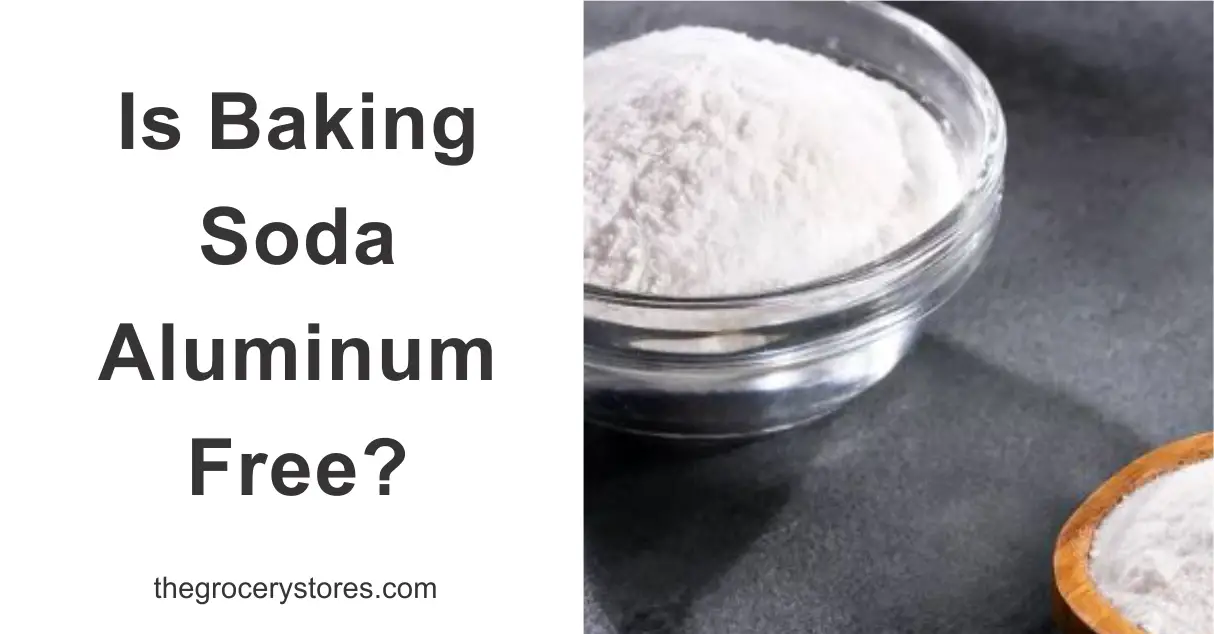Baking soda is pretty extraordinary in function, with a variety of purposes. Baking soda is used in our baked goods as it contributes immensely to how fluffy they get and also makes them ruse. It can also be used to deodorize stinky things, clean carpets, make cleaning paste, and clean dirty, messy ovens.
The presence of aluminum in our daily intake is not a very good idea, as aluminum is not something we should be consuming on a regular basis. Aluminum is normally added to our processed foods, especially baking mixes and hygiene products like our antiperspirant deodorants.
Aluminum is a neurotoxin with the tendency to lead to neurological disorders, and some research has even connected it to Alzheimer’s illness. The exact health detriment of aluminum is not really exact, but the aforementioned is enough to make you reduce your intake of aluminum-containing food or any other care product that contains the metal.
When we define baking soda by its elements, we are talking about sodium bicarbonate. Therefore, there is definitely no reason for it to contain aluminum-based acidifying agents or any other. Hence Baking soda is 100% sodium bicarbonate, but some varieties of baking soda can contain aluminum.
What brand of baking soda does not contain aluminum?
Sodium bicarbonate is the single ingredient that all baking soda brands share, making them fundamentally the same. The sole variation between brands is whether they mine baking soda organically from the ground or whether they make it in a factory.
It turns out that metal is not present in baking soda. Each and every brand, even Arm & Hammer, contains only sodium bicarbonate.
The major confusion about baking soda containing aluminum is because baking powder contains some sodium bicarbonate, which is literally the main component of baking soda, but also has other ingredients that serve as acidifying agents in the powder.
If you go shopping for baking soda, aluminum should not be of concern to you as it is 100% bicarbonate alone.
Does regular baking soda have aluminum?
Baking soda appears in a recipe’s list of components, and at first glance, it appears to be a straightforward item. However, when you enter the grocery store’s baking aisle, you are faced with an enormous variety of baking soda.
For clarity’s sake, technically all baking soda is the same, irrespective of the company that produces it, as its main and only component is sodium bicarbonate. Another product that might be referred to as baking soda and which is not sodium bicarbonate should be debunked as such and is not to be considered as baking soda.
Regular and natural baking soda, as already established, is aluminum free. Normal baking soda, which is often made in a lab or factory, doesn’t have any aluminum in it like baking soda that comes from the ground, so you don’t have to worry about accidentally eating aluminum. In addition, there are no additional chemicals or impurities in regular baking soda.
Why do they put aluminum in baking soda?
In baking powders, aluminum appears as sodium aluminum phosphate compound. This is used in baking powder as an acid required to create a chemical reaction in order for baked goods to rise by reacting with heat and other leavening agents.
On the other hand, baking soda has no relationship with aluminum, as baking soda is purely sodium bicarbonate. No matter the method, it was obtained, whether naturally or in the lab.
The concern of baking soda and aluminum is a misread identity, and there’s no reason for soda to contain an acidifying agent, aluminum-based or of any kind.
What is baking soda made up of?
Sodium bicarbonate, simply put, baking soda, originates either from trona ore, a hard, crystalline substance, or from soda ash derived through the Solvay process.
It is a weak alkali that reacts with other chemicals and is categorized as an acid salt since it is created by mixing a base (sodium hydroxide) and an acid (carbonic acid).
The wide range of uses for baking soda, such as cleaning, deodorizing, buffering, and fire extinguishing, is due to its inherent chemical and physical qualities. Instead of covering up or absorbing smells, baking soda chemically neutralizes them.
It is important to know that every step of the production process involves quality controls for sodium bicarbonate. The best possible sodium bicarbonate is produced by carefully choosing the components, machinery, and method itself.
Can I use cornstarch instead of baking soda?
You wonder what it is, but you already have what you are looking for. Cornstarch is exactly as the name implies, a starch often gotten from kernels of corn.
In the kitchen, the most common use of cornstarch is thickening, but it can also be added to sauces and soups to aid in delivering a less watery and more jelly-like texture. On the other hand, baking soda is a leavening agent that helps baked goods rise.
Hence Because they serve quite different functions in cooking, baking soda and cornstarch cannot be substituted for one another in recipes. Baking soda acts as a leavener to make baked items rise, whereas cornstarch is often used to thicken sauces and soups.
Can I bake without baking soda?
Baking soda is a very important ingredient in our baked goods when it comes to their function, so it shouldn’t really be omitted from our goods. Leaving out baking soda in your cake, bread, or even other goods can prevent it from rising as expected.
It is actually very possible to carry out the production of your baked goods without the use of baking soda, but note that you won’t have your desired result as the resulting product tends to be dense.
This is due to the fact that the chemical reaction that ordinarily takes place when baking soda is present in cookie batter does not produce carbon dioxide.
If you do not have baking soda available, you can opt for a substitute like baking powder.
Use baking powder in its place if you don’t have any baking soda. Baking powder might potentially result in bitter baked goods when used in place of baking soda. You should be careful not to use too much baking powder because it does include some salt.
What’s the difference between baking soda and baking powder?
The question of “what is the difference” when it comes to these two substances is unavoidable. This can get pretty confusing as both substances are white and powdery and are used for baking. The truth is, they are not the same thing exactly and have differences.
Baking soda is fully sodium bicarbonate (100%). It is usually derived from soda ash, which may either be harvested from a natural source or be produced synthetically. Inclusion of baking soda in some recipes sometimes requires the addition of certain acids. This aids in the acceleration of the leavening process and eliminates the bitter taste that baking soda may give our food.
However, baking powder also contains other compounds that serve as acidifying agents, with some sodium bicarbonate. This simply means you do not need to add other acids to your recipe to achieve a leavening result. This acidifying agent may appear in the form of an aluminum-based acid.
How do I know if my baking powder has aluminum in it?
Aluminum is not a factor to consider when purchasing baking soda. You might be interested in finding out whether sodium bicarbonate is created chemically in a mill or whether it is extracted straight from the ground in its natural form.
Neither one will include aluminum. However, using natural baking soda in your homemade remedies will produce better-tasting meals and better results.
If you are primarily concerned about the presence of aluminum in baking soda as a result of some producers labeling their product as aluminum-free, it makes sense to think that since some producers label their product as aluminum-free, other producers may be adding it.
However, this is entirely not the case, as baking soda has never and does not contain aluminum. The baking powder is the ingredient that may contain aluminum.
If you still have a doubt about the presence of aluminum in baking soda, you should endeavor to check the labeling when purchasing your baking soda to know the ingredients.
Why do I need aluminum-free baking powder?
Aluminum is present in baking powder because it produces heat-activated baking powder, which is the reason for its presence. This simply means that your baking powder will be activated immediately when it is exposed to the warming oven temperature.
Though there is not enough substantial proof to back up the negative effects of aluminum, the metallic after taste tends to spoil the perfectly delicious food.
Hence, choosing an aluminum-free baking powder helps to eliminate the metallic aftertaste of our perfect meal. Also, using an aluminum-free baking powder will allow our leavening agent to act immediately after it is added to our dough.
So when using an aluminum-free powder, you must be discreet. Do not wait too long to finish the dough and place it in your oven. Ensure to add it as your last component because taking it too long will reduce or void the effectiveness of the baking powder before the dough has even begun to bake. Put the mixture in the oven immediately after adding the baking powder.
Is the aluminum in baking powder bad for you?
Aluminum is present in almost all brands of baking powder. The major reason for adding aluminum to your baking powder is to make it heat sensitive.
Aluminum in your baking powder is not really harmful, but then, it may give your food a metallic after taste, which spoils your perfectly prepared food.
Absolutely everything is potentially bad for you depending on the quantity taken in. The reverse is the case when taking in the right proportion. When cooking and consuming a lot of products containing baking powder, it is advisable to go for aluminum-free baking soda. Similarly, if you don’t consume a lot, those with aluminum are slightly better.

